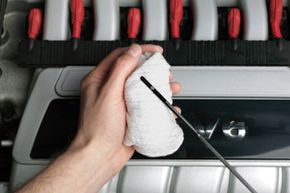We're going to give it to you straight: Yes, you can safely switch to synthetic oil. But it would probably help to know the details about what we're talking about -- specifically why this question would even come up in the first place. And it does -- a lot.
First off, let's talk about what synthetic oil is. To begin with, there's a base oil that does most of the work of lubricating engine parts. It's lab-created, as opposed to being a product of the refining process of mineral oils that are pumped out of the ground. There are also performance additives (in powder form) in many synthetic oils, and a carrier oil to suspend these additives in the mix.
Advertisement
So what's the practical difference between synthetic oils and mineral oils? There's not much difference when you're just looking at two clean puddles of oil, according to Kevin Chinn, a technical advisor at ExxonMobil. "You'd slip on both of them," he says. But the advantage of synthetic oil is that its molecular structure stays more stable with temperature changes and extends the maintenance interval between oil changes.
So why the heck wouldn't you want to switch from mineral oil to synthetic? Keep reading to find out some of the myths and realities of these high-tech oils.
Advertisement





